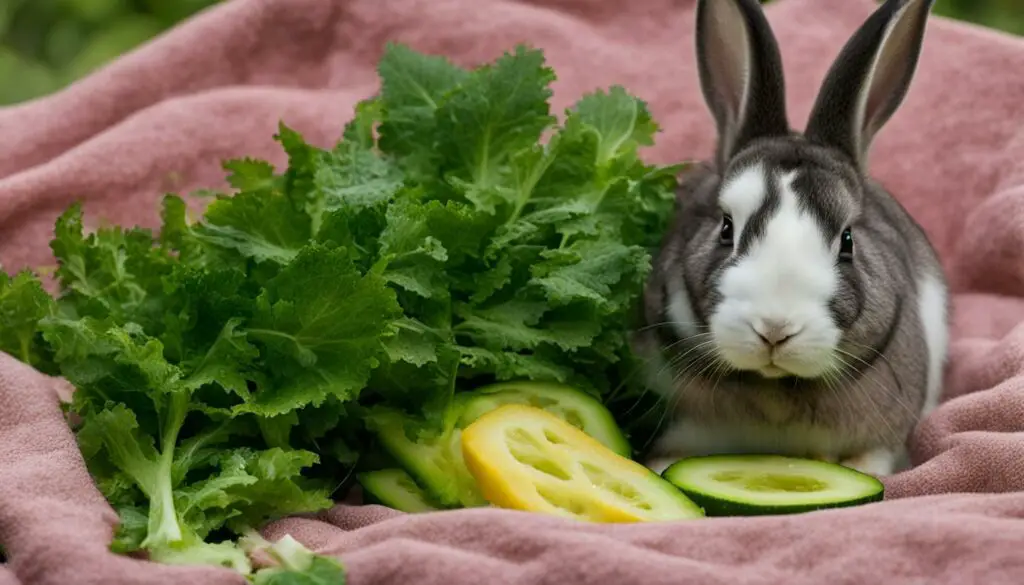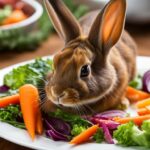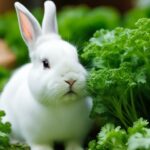Are you wondering if rabbits can eat cucumbers? As a rabbit owner, it’s important to understand what foods are safe and beneficial for your furry friend. In this guide, I will provide you with all the information you need to know about including cucumbers in your rabbit’s diet.
Rabbits can safely enjoy cucumber flesh, skin, and seeds. However, it’s essential to keep in mind that cucumbers have a high water content and are low in nutrients. Feeding your rabbit too much cucumber can lead to digestive issues, such as diarrhea. It’s best to feed cucumbers in moderation, offering a thin slice a few times per week.
Key Takeaways:
- Rabbits can eat cucumber flesh, skin, and seeds.
- Cucumbers should be fed in moderation to avoid digestive issues.
- Cucumbers are low in nutrients and should not make up a significant part of a rabbit’s diet.
- Wash cucumber thoroughly before serving to remove any pesticide residue.
- Offer cucumbers as a treat and not as a replacement for a rabbit’s main diet of hay and leafy greens.
Is Cucumber Safe for Rabbits To Eat?
Many pet owners wonder if cucumbers are safe for rabbits to eat. The answer is yes, cucumbers are non-toxic to rabbits and can be safely included in their diet. However, it’s important to remember that cucumbers should only be offered as an occasional treat and should not make up a significant portion of a rabbit’s diet.
Cucumbers are low in nutrients and fiber, so they should not be the main source of nutrition for rabbits. Instead, rabbits should primarily be fed a diet of hay and fresh leafy greens, supplemented with a small amount of vegetables and fruits.
When feeding cucumbers to rabbits, it’s crucial to provide them in moderation. Overfeeding cucumbers can lead to digestive issues such as diarrhea. It is recommended to feed rabbits one thin slice of cucumber 2-3 times per week to avoid any potential problems.
Remember, rabbits have sensitive digestive systems, and it’s essential to monitor their diet to prevent any health issues. While cucumbers can be a refreshing and hydrating treat for rabbits, it’s best to prioritize a well-balanced diet to meet their nutritional needs.
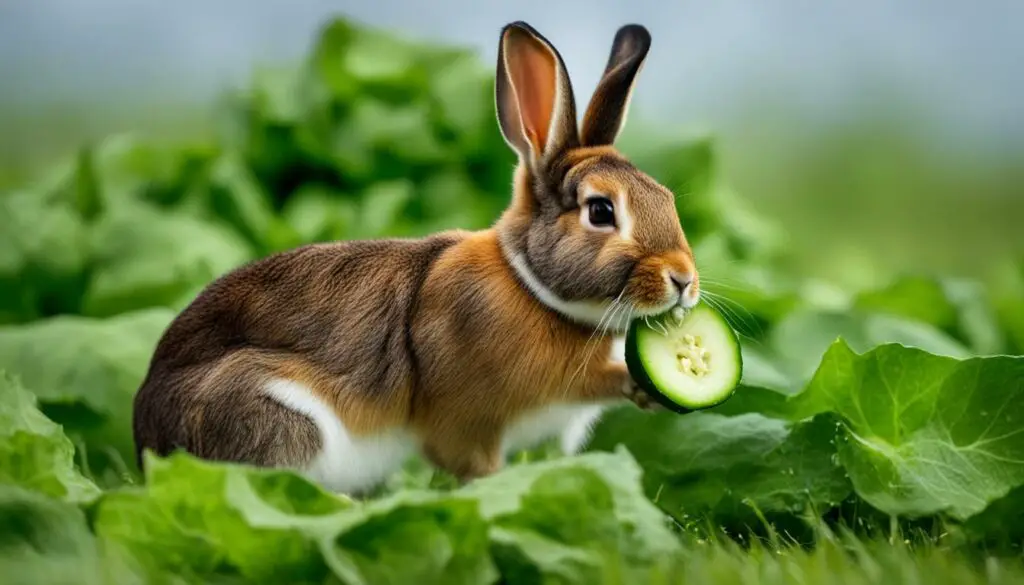
Table: Nutritional Content of Cucumber
| Nutrient | Amount per 100g |
|---|---|
| Water | 95.23g |
| Energy | 15kcal |
| Protein | 0.65g |
| Fat | 0.11g |
| Carbohydrates | 3.63g |
| Fiber | 0.5g |
| Vitamin C | 2.8mg |
Do Rabbits Like Cucumber?
When it comes to rabbits and cucumber, preferences can vary. While some rabbits may enjoy the taste of cucumber and eagerly munch on it, others may show little interest. It’s important to note that cucumber is not an essential part of a rabbit’s diet, so if your furry friend turns their nose up at it, there’s no need to worry.
Rabbits have different taste preferences, just like humans. Some enjoy the crisp and refreshing texture of cucumber, while others may prefer other leafy greens or vegetables. It’s always a good idea to offer a variety of safe vegetables and observe which ones your rabbit prefers. This way, you can ensure they are getting the nutrients they need while also catering to their personal taste.
Remember, rabbits are primarily herbivores and require a diet rich in hay and fresh leafy greens. These provide essential nutrients and fiber for their overall health. While cucumber can be a fun and occasional treat, it should not replace the main components of their diet. Moderation is key, and offering a thin slice of cucumber 2-3 times per week is sufficient.
As with any new food, it’s important to introduce cucumber slowly and in small quantities to avoid any potential digestive issues. Pay attention to your rabbit’s reaction and monitor their health after feeding cucumber. If they experience any digestive upset, such as diarrhea, it may be a sign that cucumber doesn’t agree with their system. In such cases, it’s best to discontinue offering cucumber and consult with a veterinarian if necessary.
Remember, understanding and respecting your rabbit’s preferences is crucial for their well-being. Offer a variety of safe vegetables, observe their choices, and prioritize a balanced diet that meets their nutritional needs.
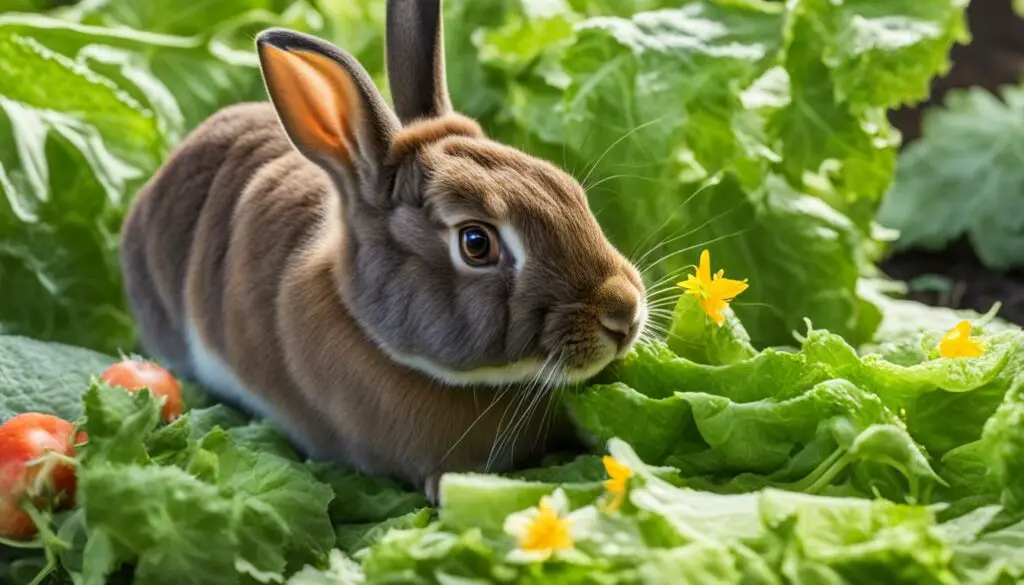
Is Cucumber Good for Rabbits?
Cucumbers can be a refreshing treat for rabbits, but it’s important to understand their nutritional value and how they should be incorporated into their diet. While cucumbers are safe for rabbits to eat, they should not be a significant part of their daily meals. Let’s take a closer look at the nutritional benefits of cucumbers for rabbits and how to offer them responsibly.
Cucumbers are primarily composed of water and have a low nutrient content. They are a good source of hydration for rabbits, especially during hot weather or if they struggle to drink enough water. However, they should not replace the mainstay of a rabbit’s diet, which should consist of hay, leafy greens, and a small amount of pellets. Feeding rabbits excessive amounts of cucumber can lead to digestive issues such as diarrhea, so it’s important to offer them in moderation.
To provide some variety and enrichment to your rabbit’s diet, you can offer cucumber slices as an occasional treat. The high water content can help keep rabbits hydrated, and most rabbits enjoy the refreshing taste. However, it’s best to limit their intake to a thin slice 2-3 times per week. Remember to wash the cucumber thoroughly to remove any pesticide residue before offering it to your rabbit.
| Nutrient | Amount per 100g |
|---|---|
| Water | 96% |
| Carbohydrates | 3.6g |
| Fiber | 0.5g |
| Protein | 0.7g |
| Fat | 0.1g |
Cucumbers are low in calories and provide a small amount of carbohydrates and fiber. They also contain some vitamins and minerals, including vitamin C, vitamin K, and potassium. However, these nutrients are not present in high enough quantities to meet all of a rabbit’s dietary needs. It’s important to offer a variety of fresh vegetables and leafy greens to ensure rabbits receive a balanced and nutritious diet.
In summary, cucumbers can be a safe and enjoyable treat for rabbits, but they should be given in moderation. They provide hydration and a small amount of nutrients, but should not replace the main components of a rabbit’s diet. Remember to wash cucumbers thoroughly and offer them as a treat, rather than a staple food. By providing a varied diet of hay, leafy greens, and limited treats like cucumber, you can ensure your rabbit stays healthy and happy.
Is Cucumber Peel Safe for Rabbits?
When it comes to feeding cucumbers to rabbits, one question that often arises is whether or not the peel is safe for them to eat. The good news is that cucumber peel is indeed safe for rabbits and can even provide additional fiber in their diet. However, it is important to ensure that the peel is thoroughly washed before offering it to your furry friend. This will help remove any pesticide residue that may be on the surface, ensuring the safety of your rabbit.
Cucumber peel can be sliced into thin strips and offered as a treat to your rabbit. This can provide them with some extra chewing and entertainment, as well as a different texture to their usual diet. However, it is important to note that cucumber peel should not replace a rabbit’s main diet of hay and leafy greens. It should be given in moderation and as an occasional addition to their overall diet.
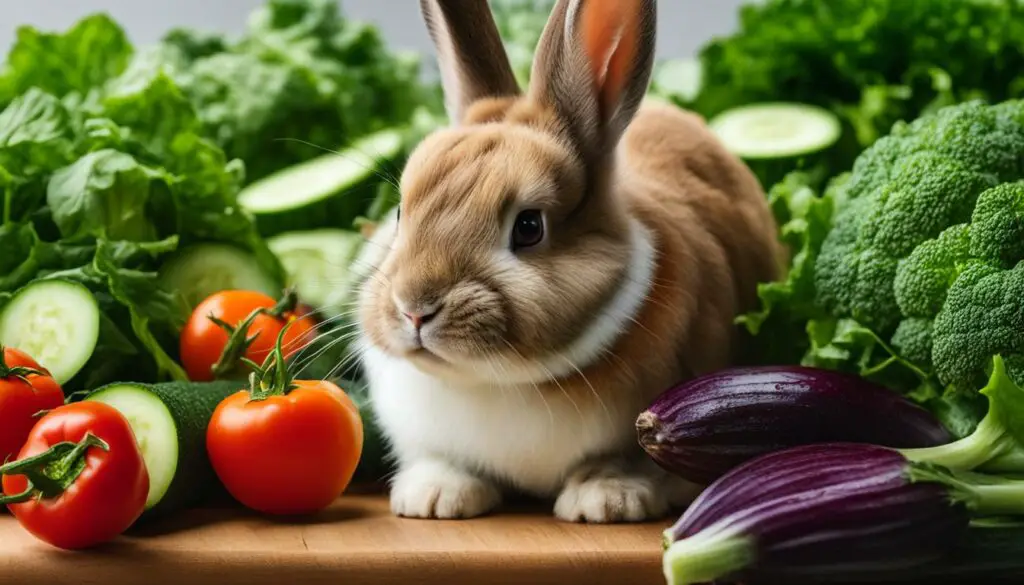
Table: Nutritional Value of Cucumber Peel
| Nutrient | Amount per 100g |
|---|---|
| Water | 95.23g |
| Carbohydrates | 2.16g |
| Fiber | 0.5g |
| Protein | 0.59g |
| Fat | 0.11g |
| Calcium | 14mg |
| Phosphorus | 24mg |
| Potassium | 147mg |
| Vitamin C | 1.2mg |
As seen in the table above, cucumber peel is primarily composed of water, with a small amount of carbohydrates and fiber. It is low in calories and contains some essential minerals like calcium, phosphorus, and potassium. However, it is important to remember that while cucumber peel can be a healthy addition to a rabbit’s diet, it should be fed in moderation and alongside a balanced diet of hay, leafy greens, and fresh water.
How Much Cucumber Can Rabbits Eat?
When it comes to feeding cucumbers to rabbits, moderation is key. While cucumbers are generally safe for rabbits to eat, they should only be offered in small quantities to avoid digestive issues. It is recommended to feed rabbits one thin slice of cucumber 2-3 times per week. Feeding too much cucumber can lead to problems such as diarrhea, which can be uncomfortable for rabbits and may require veterinary attention.
Rabbits have sensitive digestive systems, and sudden changes in their diet can disrupt their delicate balance. Cucumbers, being high in water content and low in nutrients, should not make up a significant portion of a rabbit’s diet. Instead, they should be considered as an occasional treat or a supplement to a balanced rabbit diet that consists primarily of hay, leafy greens, and fresh water.
It’s important to note that some rabbits may be more sensitive to cucumbers than others. If you observe any signs of discomfort or digestive upset after feeding cucumber to your rabbit, it’s best to discontinue offering it and consult with a veterinarian.
Remember, variety is important in a rabbit’s diet, so while it’s okay to offer cucumbers as a treat, it’s equally important to provide a range of other safe vegetables and fruits for your rabbit to enjoy. This helps ensure that they receive a well-rounded and nutritious diet.
What Problems Can Cucumber Cause?
While cucumbers are generally safe for rabbits to eat, feeding them excessive amounts can lead to various health issues. It is important to understand the potential problems that can arise from overfeeding cucumbers to rabbits.
1. Digestive Issues and Diarrhea
Rabbits have sensitive digestive systems, and consuming too much cucumber can cause digestive issues such as diarrhea. Cucumbers have a high water content, which can lead to loose stools and dehydration if consumed in excess. It is crucial to feed cucumbers in moderation to prevent these digestive problems.
2. Weight Loss and Nutritional Imbalance
Cucumbers are low in nutrients and fiber, making them poor choices for a substantial part of a rabbit’s diet. If rabbits consume too much cucumber and not enough essential nutrients from their regular diet of hay and leafy greens, they may experience weight loss and nutritional imbalances. It is crucial to provide a balanced diet for rabbits to maintain their overall health and well-being.
3. Reduced Appetite for Essential Foods
Feeding rabbits excessive amounts of cucumber can also lead to a reduced appetite for essential foods. Cucumbers, although tasty to rabbits, should only be offered as occasional treats. If rabbits fill up on cucumber, they may not consume enough hay and leafy greens, which are vital for their dental health and digestive system.
| Problem | Possible Consequences |
|---|---|
| Digestive Issues and Diarrhea | Loose stools, dehydration |
| Weight Loss and Nutritional Imbalance | Reduced body weight, deficiencies in essential nutrients |
| Reduced Appetite for Essential Foods | Inadequate intake of hay and leafy greens |
Therefore, it is essential to remember that cucumbers should not be a significant part of a rabbit’s diet and should only be offered in moderation. A varied diet that includes hay, fresh leafy greens, and limited treats like cucumber slices will help ensure the health and well-being of your furry friend.
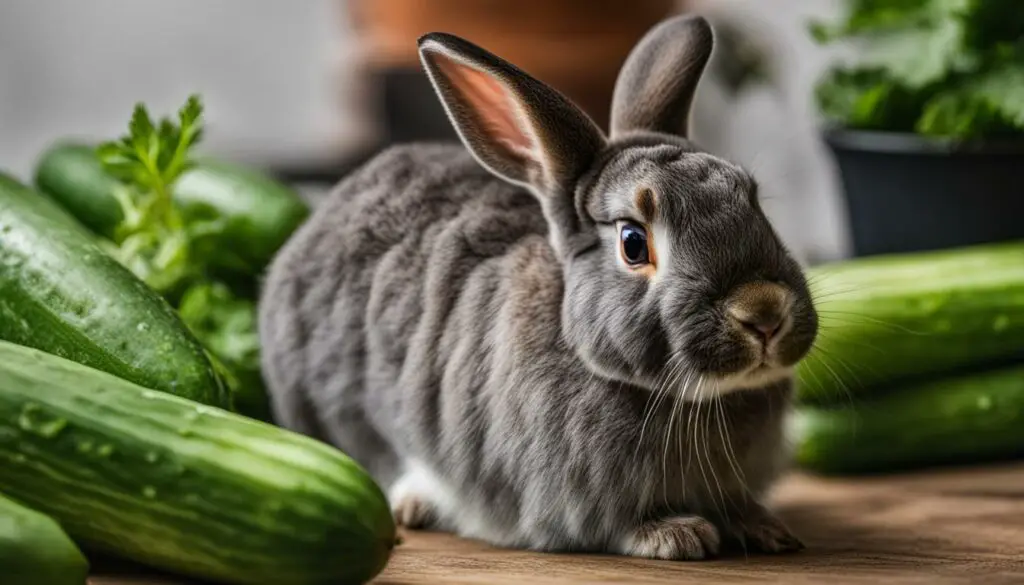
Can Baby Rabbits Eat Cucumber?
When it comes to feeding baby rabbits, the diet should primarily consist of their mother’s milk, water, and appropriate hay and pellets. It is not recommended to introduce fruits and vegetables, including cucumber, to their diet at an early age. Baby rabbits have delicate digestive systems that are still developing, and introducing new foods too soon can lead to digestive problems.
While adult rabbits can safely enjoy cucumber as an occasional treat, it is best to wait until the baby rabbits are at least 12 weeks old before introducing cucumber into their diet. At this age, their digestive system will be better equipped to handle the additional fiber and water content found in cucumber.
Remember, baby rabbits have specific dietary needs that are different from adult rabbits, and it’s crucial to provide them with the appropriate nutrition to support their growth and development. Stick to their mother’s milk, water, and hay until they are old enough to safely incorporate fruits and vegetables into their diet.
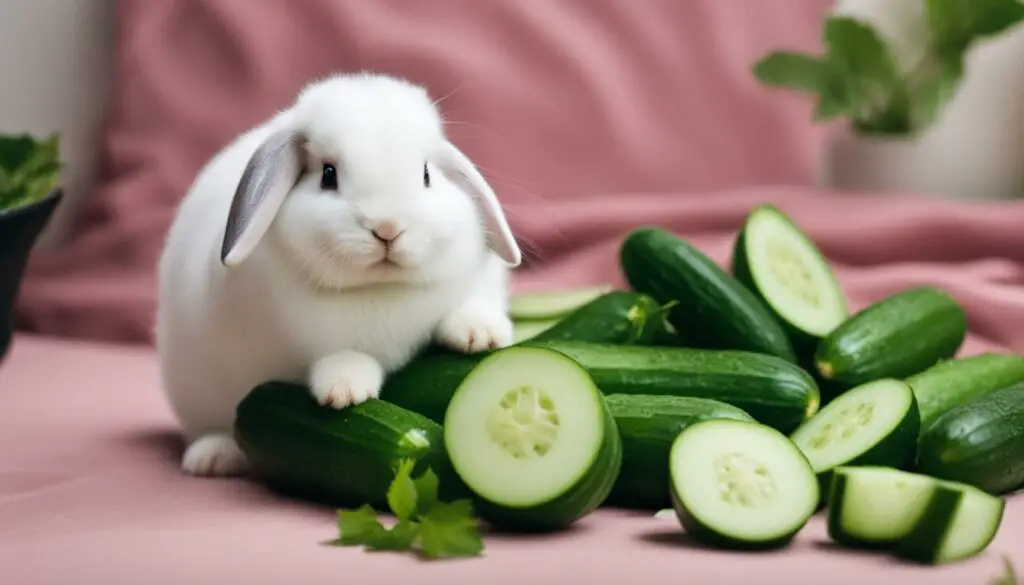
How To Prepare Cucumber for Pet Rabbits
Cucumbers can be a refreshing and tasty treat for pet rabbits. However, it’s important to prepare them properly to ensure they are safe and enjoyable for your furry friend. Here are some tips on how to prepare cucumber for rabbits:
- Wash the cucumber: Before serving cucumber to your rabbit, make sure to wash it thoroughly to remove any dirt or pesticide residue. This will help keep your rabbit safe and healthy.
- Trim the ends: Trim off both ends of the cucumber before slicing it. This will ensure that your rabbit doesn’t accidentally eat any tough or fibrous parts of the cucumber.
- Slice it thinly: Cut the cucumber into thin slices, as this will make it easier for your rabbit to eat and digest. Avoid feeding your rabbit large chunks of cucumber, as it can be difficult for them to handle.
Remember, while cucumbers can be a tasty treat for your rabbit, they should not replace their main diet of hay and leafy greens. Cucumber should only be offered in moderation and as an occasional snack. It’s important to provide your rabbit with a balanced and varied diet to ensure their nutritional needs are met.
“Cucumbers can be a healthy and hydrating treat for rabbits, but it’s important to prepare them properly and feed them in moderation.”
By following these tips, you can safely prepare cucumber for your pet rabbit and provide them with a refreshing and nutritious snack. Just remember to always monitor portion sizes and avoid overfeeding cucumbers to prevent any digestive issues. Your rabbit will appreciate the tasty treat!
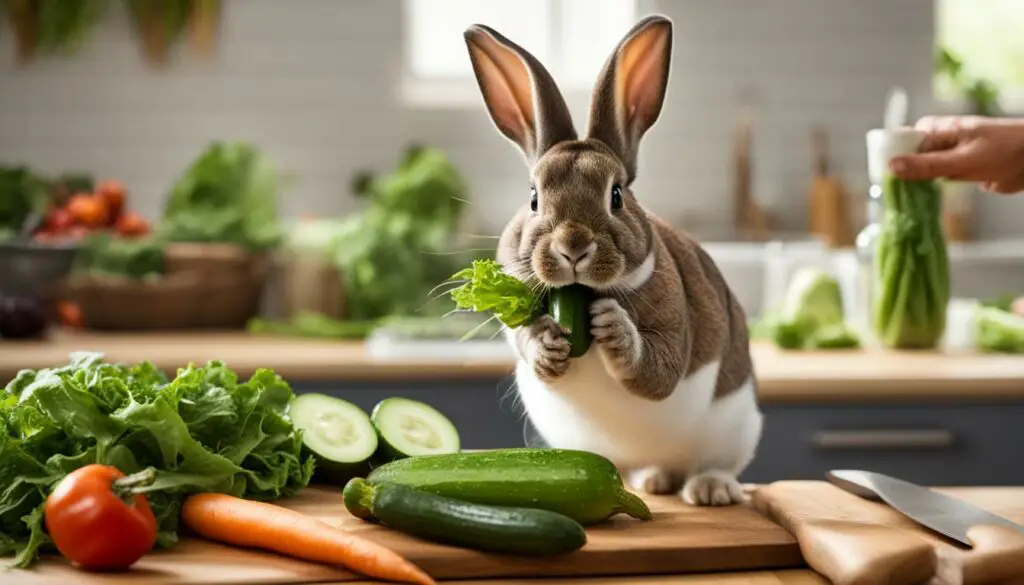
| Benefits of Feeding Cucumbers to Rabbits | Potential Risks of Feeding Cucumbers to Rabbits |
|---|---|
| 1. Hydrating: Cucumbers have a high water content, making them a great way to keep your rabbit hydrated. | 1. Digestive issues: Feeding excessive amounts of cucumber can lead to diarrhea and other digestive problems in rabbits. |
| 2. Low in calories: Cucumbers are low in calories, making them a healthy snack option for rabbits. | 2. Nutritional deficiencies: Cucumbers are low in nutrients and should not make up a significant portion of a rabbit’s diet. |
| 3. Source of fiber: The skin and seeds of cucumbers provide additional fiber, promoting healthy digestion in rabbits. | 3. Pesticide exposure: It’s important to wash cucumbers thoroughly to remove any pesticide residue before feeding them to rabbits. |
Are Cucumber Leaves Safe for Rabbits?
When it comes to feeding rabbits, it’s important to provide a diverse diet that includes a variety of fresh vegetables and leafy greens. But what about cucumber leaves? Can rabbits safely eat this part of the cucumber plant? The answer is yes! Cucumber leaves are safe for rabbits to consume and can provide additional nutrients to their diet.
Just like with any other food, it’s crucial to wash cucumber leaves thoroughly before offering them to your rabbit. This helps remove any potential pesticide residue that could be harmful to your furry friend. Once washed, you can serve the leaves to your rabbit as part of their rotation of leafy greens.
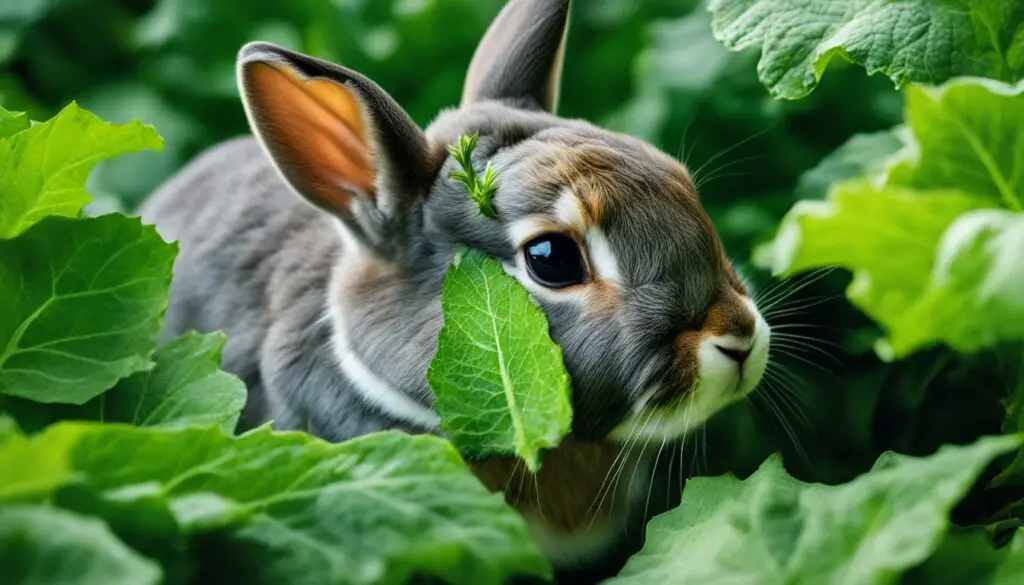
“Rabbits can enjoy the refreshing taste and nutritional benefits of cucumber leaves when included in their diet.”
Including cucumber leaves in your rabbit’s diet can offer additional nutrients such as vitamin K, vitamin C, and calcium. These nutrients help support their overall health and well-being. However, it’s important to remember that cucumber leaves, just like the rest of the cucumber plant, should be fed in moderation. They should not replace the main components of a rabbit’s diet, which are hay and leafy greens.
Cucumber Leaves Nutritional Value
To give you a better idea of the nutritional value of cucumber leaves, here’s a table summarizing their key nutrients:
| Nutrient | Amount per 100g |
|---|---|
| Vitamin K | 62.3mcg |
| Vitamin C | 13.2mg |
| Calcium | 19mg |
As you can see, cucumber leaves can provide rabbits with valuable nutrients that contribute to their overall health. Including a variety of leafy greens, including cucumber leaves, in your rabbit’s diet can help ensure they receive a well-rounded and balanced nutrition.
Are Cucumber Flowers Safe for Rabbits?
In addition to cucumber flesh, skin, and seeds, rabbits can also safely eat cucumber flowers. These delicate blossoms are not only safe for rabbits, but they can also be a tasty and refreshing treat for them. Cucumber flowers can be sprinkled over hay or offered as part of a rabbit’s fresh vegetable portion to encourage grazing and provide a diverse range of flavors and textures in their diet.
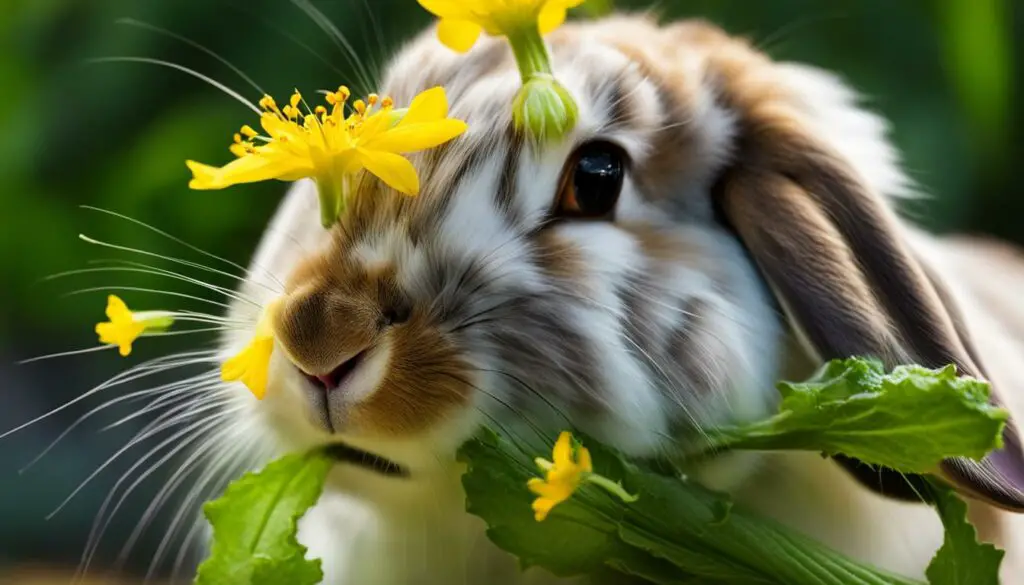
When offering cucumber flowers to rabbits, it’s important to ensure they haven’t been treated with any pesticides or chemicals. Wash the flowers thoroughly before serving, just like you would with any other fresh produce. By providing cucumber flowers as a treat, you can give your rabbits a chance to experience different flavors and enrich their diet.
Remember, while cucumber flowers are safe for rabbits to eat, they should be given in moderation. Just like with cucumber itself, it’s important to avoid overfeeding rabbits with any single food item. Keep cucumber flowers as a small part of their overall diet, which should primarily consist of hay, leafy greens, and fresh water for optimal nutrition and digestive health.
Conclusion
After examining the role of cucumbers in a rabbit’s diet, it can be concluded that while cucumbers are safe for rabbits to eat, they should only be offered in moderation as a treat. Cucumbers have a high water content and few nutrients, so they should not make up a significant portion of a rabbit’s diet.
In order to maintain a healthy and balanced diet, rabbits should primarily be fed hay, leafy greens, and fresh water. Cucumbers can be given as an occasional snack, with a recommended portion size of one thin slice 2-3 times per week. Feeding too much cucumber can lead to digestive issues such as diarrhea, so it is important to monitor portion sizes and avoid overfeeding.
While some rabbits may enjoy the taste of cucumber, it is not a necessary part of their diet. If a rabbit does not show interest in cucumbers, there is no need to force it. It is important to provide a variety of safe fruits and vegetables to ensure a well-rounded diet for rabbits.
Overall, cucumbers can be included as part of a balanced rabbit diet, but they should be given in moderation. As with any dietary changes, it is always recommended to consult with a veterinarian to ensure that the specific needs of your rabbit are being met.
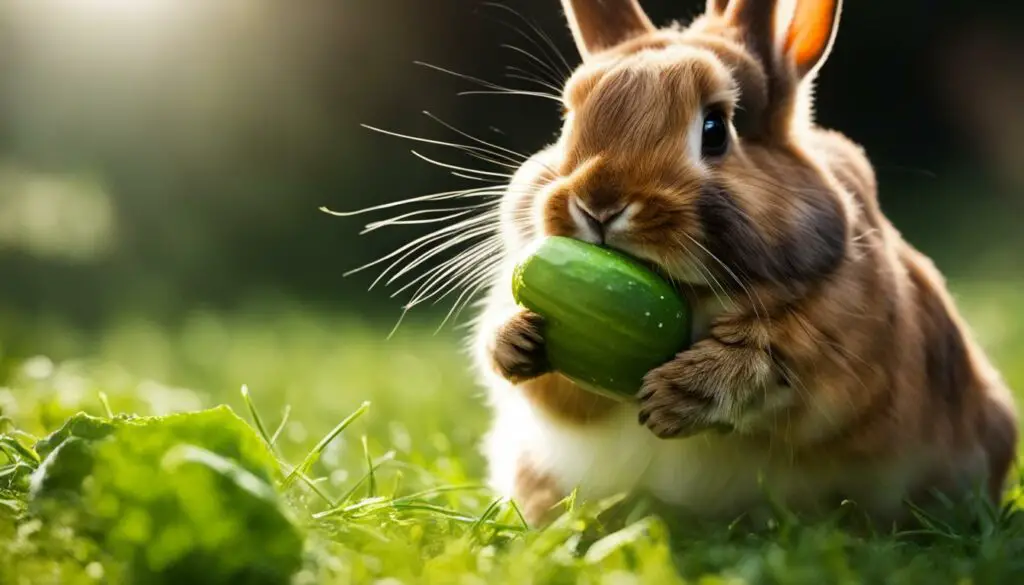
Related Articles
When it comes to treating your rabbit, it’s important to consider their overall nutrition and health. While cucumbers can be a safe and tasty treat for rabbits, there are other healthy options to explore. Offering a variety of fruits and vegetables in moderation can help add nutritional value to your rabbit’s diet.
When choosing treats for your rabbit, consider options like carrots, apples, and leafy greens. These provide essential vitamins, minerals, and fiber to support your rabbit’s overall wellbeing. Remember to introduce new foods gradually, as sudden changes can upset your rabbit’s digestion.
It’s also important to note that treats should not make up the majority of your rabbit’s diet. A balanced rabbit diet primarily consists of high-quality hay, fresh water, and limited amounts of pellets. Consult with a veterinarian to determine the specific dietary needs of your rabbit and to ensure they are receiving the proper nutrition.
By providing a well-rounded diet and offering healthy treats in moderation, you can ensure that your rabbit stays happy and healthy. Remember to pay attention to portion sizes and monitor your rabbit’s overall health to avoid any potential issues. With the right balance of nutrition and treats, you can provide your rabbit with a fulfilling and enjoyable diet.
FAQ
Can rabbits eat cucumbers?
Yes, rabbits can safely eat cucumber flesh, skin, and seeds. However, it should be fed in moderation as a treat.
Is cucumber safe for rabbits to eat?
Yes, cucumbers are non-toxic to rabbits and can be safely eaten. However, they should only be offered as an occasional treat.
Do rabbits like cucumber?
Some rabbits enjoy the taste of cucumber, while others may not be interested. It’s not necessary to offer it if a rabbit doesn’t like it.
Is cucumber good for rabbits?
Cucumber is low in nutrients and fiber, so it should not be a significant part of a rabbit’s diet. It should only be offered in moderation as a treat.
Is cucumber peel safe for rabbits?
Yes, cucumber peel is safe for rabbits to eat. However, it should be thoroughly washed to remove any pesticide residue.
How much cucumber can rabbits eat?
It is recommended to feed rabbits one thin slice of cucumber 2-3 times per week. Feeding too much cucumber can lead to digestive issues.
What problems can cucumber cause for rabbits?
Feeding rabbits excessive amounts of cucumber can cause digestive issues such as diarrhea and weight loss. Cucumbers should only be fed in moderation.
Can baby rabbits eat cucumber?
No, baby rabbits should not eat cucumber. They should stick to a diet of mother’s milk, water, and appropriate hay and pellets.
How to prepare cucumber for pet rabbits?
Cucumbers should be washed thoroughly before serving to rabbits. The skin and seeds are safe for rabbits to eat. Thinly-cut slices can be offered as a treat.
Are cucumber leaves safe for rabbits?
Yes, cucumber leaves are safe for rabbits to eat and can provide additional nutrients. They should be washed before serving.
Are cucumber flowers safe for rabbits?
Yes, cucumber flowers are safe for rabbits to eat and can be enjoyed as part of their fresh vegetable portion. They can be sprinkled over hay to encourage grazing.
Conclusion
Cucumbers can be safely fed to rabbits in moderation as a treat, but should not make up a significant portion of their diet. It is important to provide a balanced diet for rabbits to ensure their overall health and well-being.
Related Articles
For more information on healthy treats for rabbits and rabbit nutrition, please check our other articles on rabbit food.

